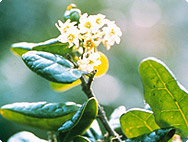
Peumus boldus MOL.
Boldo

History
The name Peumus is derived from peumo, a name that probably goes back
to the Mapuche Indians of Chile. The species name boldus is in honour
of the Spanish botanist, Boldo.
The monimiaceae family is of particular interest because it is a very
old plant family. The remaining stock has survived only in isolated
areas with ideal growing conditions. They show a remarkable diversity
in their formation.
Botanical Characteristics
Boldo is an evergreen tree or shrub growing up to six metres in height. It belongs to the monimiaceae family, which are closely related to the laurel family. It is dioecious. Boldo's light grey-green leathery leaves are elliptical-oval, entire, and have light-coloured tubercles on the surface. They have a characteristic odour and a burning-spicy, slightly bitter taste. The intensely fragrant radial flowers are white or yellowish and arranged in an inflorescence. The oval, aromatic pitted fruits are edible. Boldo flowers throughout the year.
Habitat
The Boldo tree is the characteristic plant of the dry areas of Chile
and Peru. Together with other shrubs, it forms a dense bush savannah.
The leaves are gathered throughout the year.
Preparation
A.Vogel/Bioforce uses the dried, shredded leaves to produce an alcohol extract. Infusions of the dried, shredded leaves are also common. In Chile, the Boldo bark is also used medicinally. There it is thought to be more effective than the leaves which are used in Chile as a kitchen seasoning. The essential oil is used in the perfume industry. The Boldo tree also provides a bark dye and a hardwood also known by the name of Boldo.
A.Vogel Blog – Natural and Healthy
Inspiration for a healthy life!
HERBAMARE SOUP-ER SOUPS!
DOWNLOAD YOUR FREE RECIPE BOOKLET!
8 healthy, hearty and delicious homemade soups.
Supporting a healthier happier you
“Nature is just about the best thing we’ve got!“
Alfred Vogel's guide to leading a healthy and happy life
Healthy & nutritious dinner ideas
Get new recipes in your inbox every month. Sign up now